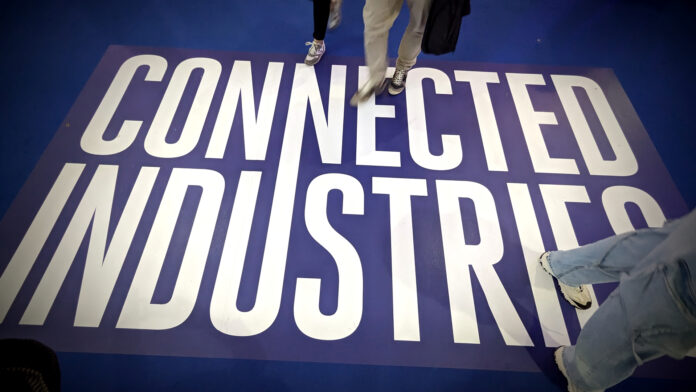More evidence, if it was needed, that 5G is all about enterprises – whether it is used by operators, themselves, to drive internal efficiencies, or sold to other sectors as private networks, network slices, or wide-area networks (WAN) services. Ahead of MWC, the GSMA has issued a press notice to suggest the manufacturing, financial services, automotive, and aviation industries, among others, will deliver a whopping $11 trillion in GDP value in the period to 2030 – by using 5G, and other “advanced connectivity and mobile technologies” to drive their digital change agendas.
This is the headline stat from the GSMA Intelligence, its research arm, to drive interest in its Connected Industries programme at MWC in Barcelona, starting next week (March 2). “5G [is] set to fuel significant gains in GDP,” it stated. The projected $11 trillion uplift in gross domestic product (GDP) is equivalent to 8.4 percent of the total world GDP as it stands. It hailed a “surge” and “dramatic shift in the global economy”, driving the 5G-related (!!!) value spiralling upwards from a claimed $6.5 trillion of GDP (5.8 percent of the total) in 2024. This shows the “growing role and exciting potential of digital technologies and enterprise transformation in reshaping industries”, it declared.
A new report from GSMA Intelligence, called Economic Growth and the Digital Transformation of Enterprises 2025, is available here. It also covers IoT, robotics, cloud/edge computing, AI, blockchain – bucketed as drivers and complements for ‘advanced connectivity’ (like 5G). But it explained away the 5G focus: “5G stands out as a key component of economic growth, with nearly 85 percent of enterprises rating 5G as critical to their digital transformation strategies… 5G is enabling use cases previously constrained by legacy technologies.” The Industry 4.0 agenda at MWC also covers digital change in sports and entertainment, but the industrial focus is clear.
Manufacturing, financial services, automotive, and aviation are called “pivotal sectors”, contributing nearly 34 percent of the projected $11 trillion impact by 2030. Manufacturing accounts for 23 percent of global GDP, as it stands. Financial services contributes seven percent, automotive contributes three percent, and aviation contributes one percent; deployment of new digital tech will see their GDP values jump by $2.1 trillion, $900 billion, $600 billion, and $200 billion by 2030, respectively. The manufacturing industry is reaching for 5G, and related technologies, to solve “significant challenges including supply chain disruptions and the need to adjust to climate targets”, it said.
GSMA Intelligence stated: “By integrating advanced connectivity solutions, including 5G, manufacturers could achieve over $400 billion in annual cost savings by 2030.” The financial services sector could see an “indirect” uplift in revenue of $140 billion in the same time frame. The automotive industry could see savings of $45 billion annually by 2030 – because of “smart automotive factories and autonomous vehicle operations”. IoT sensors and AI systems in the aviation industry – supported here and there by 5G, and grouped as “smart airport solutions” – will enhance monitoring, tracking, and security to the tune of $10 billion in airport savings per year by 2030, it calculates.
Pau Castells, head of economic analysis at GSMA Intelligence, said: “Advanced connectivity such as 5G is unlocking new opportunities for innovation and growth. However, to realise its full potential, more collaboration is needed between policymakers, network operators and enterprises to overcome barriers to enterprise adoption such as high implementation costs and lack of technical expertise. Only through deep cooperation can we fully harness the benefits of this digital revolution.”
Richard Cockle, leading the GSMA’s Connected Industries project , also head of the GSMA Foundry, said: “Connected Industries at MWC offers a unique opportunity for businesses and technology leaders to hear first-hand from our GSMA members and partners on how emerging mobile technologies and 5G applications are shaping industries and enabling new use cases like enhanced factory floor automation, improved fraud prevention, smart airports and connected and autonomous vehicles. Mobile is certainly at the heart of digital transformation and our summits at MWC will showcase these innovations throughout the week.”
The GSMA is running a parallel programme at MWC called Connected Communities – “to bring mobile network operators and industry together to innovate”.

